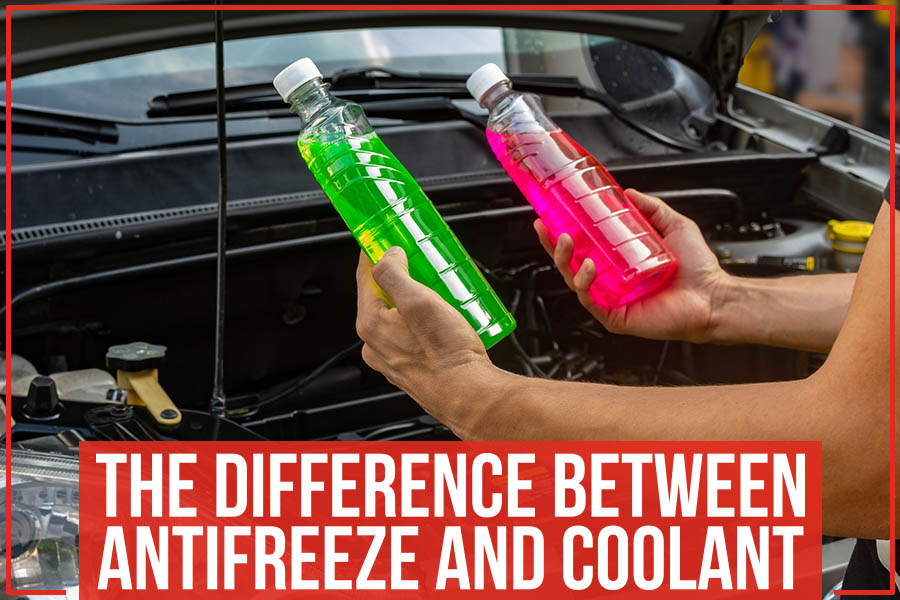
Key Takeaways:
- Coolant helps prevent your engine from overheating.
- Antifreeze keeps the coolant from freezing within the radiator coils in cold weather.
- An overheating car indicates a possible need to change coolant.
- Both antifreeze and coolant contain glycol, which helps prevent corrosion.
- Antifreeze has a higher boiling point than the coolant and helps prevent freezing.
- Always use a 50/50 mixture of antifreeze and water.
- You can go longer between changes with OAT coolant.
- OAT coolants are the more popular choice in recent years.
Many car owners don’t know the difference between antifreeze and coolant when maintaining vehicles. Antifreeze is a chemical or ethylene glycol-based liquid used in cars to prevent the water in the radiator coils from freezing during winter. Coolant, on the other hand, is a mixture of water and antifreeze that keeps the engine from overheating. Let’s take a closer look now.
How Does Antifreeze / Coolant Work?
Your car’s engine produces much heat when it is running. To keep the engine from overheating, a coolant is circulated through it. The coolant absorbs the heat and then carries it away from the engine to be cooled off. The coolant is kept in a reservoir usually located under the car’s hood. When the engine is turned off, the coolant stops circulating and starts to cool down. Most antifreeze types also contain corrosion inhibitors to protect the engine from rust and other forms of corrosion.
What to Know About Engine Coolant?
Engine coolant is a combination of water and antifreeze that helps keep your car’s engine from overheating. The radiator in your car circulates the coolant through the engine to help keep it at a consistent temperature. If your city experiences extreme temperatures, it’s necessary to ensure that your car’s coolant can withstand the heat. You can buy coolant that is already mixed or mix it yourself. The ratio of water to antifreeze in the coolant should be 50/50. This ratio can vary depending on the climate you live in.
Can You Use Coolant in Very Cold Winters and Very Hot Summers?
If your city experiences very cold winters, use a coolant with a low freezing point. This will help keep your car’s engine from freezing. Antifreeze is a chemical that lowers the freezing point of water, so it’s added to the coolant to help prevent the water from freezing.
Use a coolant with a high boiling point if your area gets very hot summers. This will help keep your car’s engine from overheating. Coolant boils at a lower temperature than water, so it helps keep the engine cool.
When Should You Use Antifreeze?
Use antifreeze in the winter to keep your car’s engine from freezing. It is typically added to the coolant reservoir when the weather gets cold. You can find antifreeze at auto parts stores. Be sure to check what type of antifreeze your car needs before you buy it.
If your car’s engine is running hot, you may need to add antifreeze. Check the level in the reservoir and add more if needed. Be sure to bleed the air out of the cooling system if you add more coolant. The radiator should be two-thirds full.
Why are You Losing Coolant Frequently?
One possibility is a leak in the radiator or one of the hoses. Another possibility is that the water pump isn’t circulating the coolant properly. Suppose you’re losing coolant and don’t know why; take your car to a mechanic and have it checked out. In the meantime, check the coolant level in the radiator frequently and add more if necessary.
What to Do When Your Coolant Level is Low?
If your car’s coolant is low, you will need to add more. You can see the coolant reservoir under the hood of your car. It will have a fill line that indicates how much coolant your car needs. Be sure not to overfill it. Once you’ve added the coolant, replace the cap and screw it on tightly. It’s imperative to check your car’s coolant level regularly. If you notice that it is low, add more as soon as possible. Allowing your car to run low on coolant can cause serious damage to the engine.
Complete Coolant Replacement – When to do it?
It’s important to know when to do a complete coolant replacement. Depending on your vehicle type, change the coolant every two years or 30,000 miles, whichever comes first. Antifreeze can last much longer, but it’s a good idea to replace it every five years or 100,000 miles to be safe. However, check your owner’s manual to be sure. If you don’t replace the coolant in your car, it can become contaminated and no longer effective.
Suppose your car is overheating more often than usual or the temperature gauge is reading higher than normal. In that case, it could indicate that it’s time for a coolant flush. Other signs include rusty-colored coolant, sweet-smelling coolant, or low coolant levels.
Is Coolant Also Known as Radiator Fluid?
Yes, coolant is also known as radiator fluid. It is circulated through the engine and absorbs heat residual heat for dissipation. It then carries this heat to the radiator, which is discharged into the air.
Check out our blog to discover how to find out if your radiator is going bad.
What’s the Difference Between IAT and OAT Antifreeze?
There are two types of coolant used in vehicles, IAT and OAT. IAT, or Inorganic Additive Technology, has been around the longest. It’s a mixture of water and silicate, with other additives to help protect against corrosion. OAT, or Organic Acid Technology, is newer and uses different ingredients to achieve the same goal.
The main difference between IAT and OAT is how they protect against corrosion. IAT creates a barrier between metal surfaces, while OAT changes the pH of the coolant to make it more acidic. This acidity helps prevent corrosion from occurring in the first place.
OAT coolants also have a longer lifespan than IAT coolants. This is because the organic acids in OAT coolants don’t break down as quickly as the silicates in IAT coolants. It means you can go longer between changes with OAT coolant, which is why it’s become the more popular choice in recent years.
If you seek professional car services, Feldman Chevrolet of Lansing, serving Grand Rapids, MI, is your ideal Chevrolet service center. We offer numerous top-notch car services to keep your car running smoothly. From oil changes and tire rotations to brake repairs and engine diagnostics, we have the expertise to get the job done right. We offer competitive pricing on car services. So, if you seek quality car care at an affordable price, look no further than us!
Schedule a Service Appointment Today!







